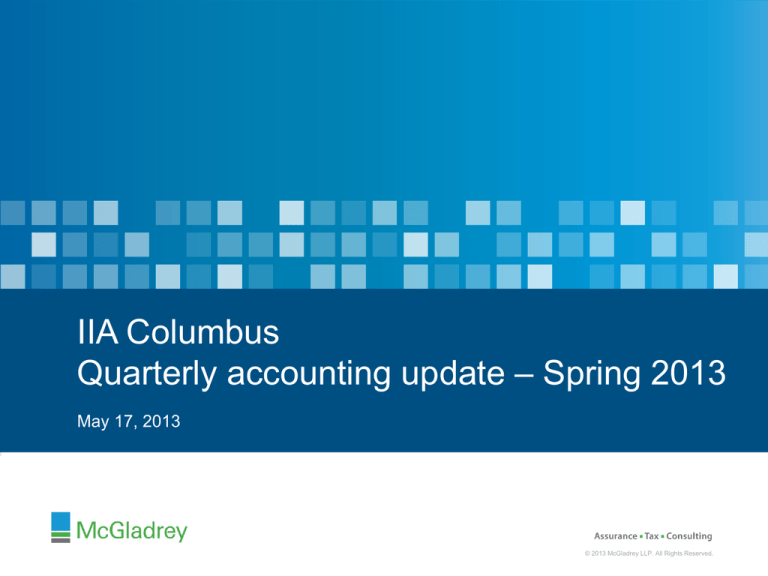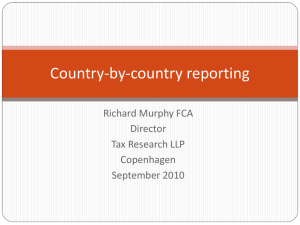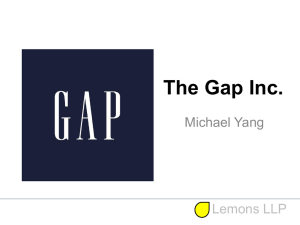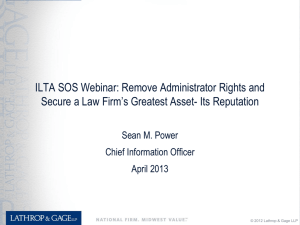
IIA Columbus
Quarterly accounting update – Spring 2013
May 17, 2013
© 2013 McGladrey LLP. All Rights Reserved.
© 2013 McGladrey LLP. All Rights Reserved.
Today’s presenter from McGladrey
Brandon Rucker, Partner
© 2013 McGladrey LLP. All Rights Reserved.
Agenda
Recently issued and effective guidance
10 min.
FASB/IASB convergence projects
40 min.
Questions and closing remarks
10 min.
© 2013 McGladrey LLP. All Rights Reserved.
Objective
By the end of this webcast, you will have a high level
understanding of certain recently issued and effective
accounting guidance as well as the status of the major
FASB/IASB convergence projects.
© 2013 McGladrey LLP. All Rights Reserved.
Recently issued
and effective guidance
© 2013 McGladrey LLP. All Rights Reserved.
ASU 2013-02 - Reporting of amounts reclassified
out of accumulated other comprehensive income
Addresses presentation requirements for items
reclassified out of accumulated other
comprehensive income (AOCI)
No change to the current requirements for reporting
net income or other comprehensive income
Requires an entity to provide information about the
amounts reclassified out of AOCI by component
© 2013 McGladrey LLP. All Rights Reserved.
ASU 2013-02 - Reporting of amounts reclassified
out of accumulated other comprehensive income
On the face of the statement where net income is
presented or in the notes, present amounts reclassified out
of AOCI by the respective line items in net income if the
amount is required to be reclassified to net income in its
entirety
For amounts not required to be reclassified in their entirety
to net income, cross-reference to other disclosures
Effective date and transition
Public
Nonpublic
Effective prospectively for reporting periods beginning after
December 15, 2012
Effective prospectively for reporting periods
beginning after December 15, 2013
© 2013 McGladrey LLP. All Rights Reserved.
ASU 2013-04 - Obligations resulting from
certain joint and several liability arrangements
Provides guidance on obligations resulting from
joint and several liability arrangements for which the
total amount under the arrangement is fixed at the
reporting date
-
Applies to debt arrangements, other contractual
obligations, and settled litigation and judicial rulings
Currently there is diversity in practice
-
Some entities record the entire obligation
Other entities record less than the entire obligation, such
as an amount corresponding to the proceeds received
© 2013 McGladrey LLP. All Rights Reserved.
ASU 2013-04 - Obligations resulting from
certain joint and several liability arrangements
Measure obligations as the sum of the following:
-
The amount the reporting entity agreed to pay on the
basis of the arrangement among its co-obligors
Any additional amount the reporting entity expects to pay
on behalf of its co-obligors
Disclose the nature and amount of those obligations as
well as other information about those obligations
Effective date and transition
Public
Nonpublic
Effective retrospectively for fiscal years, and interim periods
within those years, beginning after December 15, 2013
Effective for fiscal years ending after December 15, 2014,
and interim periods and annual periods thereafter
© 2013 McGladrey LLP. All Rights Reserved.
ASU 2013-05 - Cumulative translation
adjustments
Resolves the diversity in practice as to whether ASC
810-10, Consolidation—Overall, or ASC 830-30, Foreign
Currency Matters—Translation of Financial Statements,
applies to the release of the cumulative translation
adjustment (CTA) into net income upon a derecognition
event
The derecognition guidance in ASC 810-10 supports
releasing the CTA upon the loss of a controlling financial
interest
ASC 830-30 provides for the release of the CTA only if a
sale or transfer represents a complete or substantially
complete liquidation of an investment in a foreign entity
© 2013 McGladrey LLP. All Rights Reserved.
ASU 2013-05 - Cumulative translation
adjustments
Differentiates between transactions within a foreign entity
and those that relate to an investment in a foreign entity
For transactions within a foreign entity, ASC 830-30 applies:
- CTA should be released only if the sale or transfer results in the
complete or substantially complete liquidation of the foreign entity in
which the subsidiary or group of assets had resided
For transactions that change an investment in a foreign
entity, the CTA should be released upon the occurrence of
either:
-
-
Events that result in the loss of a controlling financial interest
in a foreign entity, or
Events that result in an acquirer obtaining control of an
acquiree in which it held an equity interest immediately
before the acquisition date (i.e., a step acquisition)
© 2013 McGladrey LLP. All Rights Reserved.
ASU 2013-05 - Cumulative translation
adjustments
Effective date and transition
Public
Nonpublic
Effective prospectively for fiscal years (and interim
reporting periods within those years) beginning after
December 15, 2013
Effective prospectively for the first annual period
beginning after December 15, 2014, and interim
and annual periods thereafter
© 2013 McGladrey LLP. All Rights Reserved.
Other recently issued guidance
Nonpublic calendar year-end entities - ASUs effective in 2013
2011-10 - Derecognition of in Substance Real Estate – a Scope Clarification
2011-11 - Disclosures about Offsetting Assets and Liabilities
2012-02 - Testing Indefinite-Lived Intangible Assets for Impairment
2012-06 - Subsequent Accounting for an Indemnification Asset Recognized at the
Acquisition Date as a Result of a Government-Assisted Acquisition of a Financial
Institution
2012-07 - Accounting for Fair Value Information That Arises after the Measurement
Date and Its Inclusion in the Impairment Analysis of Unamortized Film Costs
2013-01 - Clarifying the Scope of Disclosures about Offsetting Assets and
Liabilities
2013-03 - Clarifying the Scope and Applicability of a Particular Disclosure to
Nonpublic Entities
Nonpublic calendar year-end entities - ASUs effective in 2014
-
2011-06 - Fees Paid to the Federal Government by Health Insurers
2012-01 - Continuing Care Retirement Communities - Refundable Advance Fees
2012-04 - Technical Corrections and Improvements
2012-05 - Not-for-Profit Entities: Classification of the Sale Proceeds of Donated
Financial Assets in the Statement of Cash Flows
© 2013 McGladrey LLP. All Rights Reserved.
Other recently issued guidance
Public calendar year-end entities - ASUs effective in 2013
-
-
2011-10 - Derecognition of in Substance Real Estate – a Scope
Clarification
2011-11 - Disclosures about Offsetting Assets and Liabilities
2012-01 - Continuing Care Retirement Communities - Refundable
Advance Fees
2012-02 - Testing Indefinite-Lived Intangible Assets for Impairment
2012-04 - Technical Corrections and Improvements
2012-06 - Subsequent Accounting for an Indemnification Asset
Recognized at the Acquisition Date as a Result of a GovernmentAssisted Acquisition of a Financial Institution
2013-01 - Clarifying the Scope of Disclosures about Offsetting
Assets and Liabilities
Public calendar year-end entities - ASUs effective in 2014
-
2011-06 - Fees Paid to the Federal Government by Health Insurers
2012-05 - Not-for-Profit Entities: Classification of the Sale Proceeds
of Donated Financial Assets in the Statement of Cash Flows
© 2013 McGladrey LLP. All Rights Reserved.
FASB/IASB convergence projects
© 2013 McGladrey LLP. All Rights Reserved.
Major FASB/IASB convergence projects timeline
Project
Status
2Q
Financial Instruments
Recognition and measurement
ED issued in February 2013
C
Impairment
ED issued in December 2012
C
Hedging
DP issued in February 2011
Leases
ED issued in August 2010
ED
Revenue Recognition
Revised ED issued in November 2011
F
ED = exposure draft DP = discussion paper C = comment deadline F = final
© 2013 McGladrey LLP. All Rights Reserved.
Financial Instruments project
© 2013 McGladrey LLP. All Rights Reserved.
Recognition and measurement – Exposure
draft
Issued February 14
Comment period ends May 15
Applies to all entities and most financial instruments
-
Certain specialized industry guidance would be retained
Transition would be through cumulative effect
adjustment to opening balance sheet
No proposed effective date
© 2013 McGladrey LLP. All Rights Reserved.
Recognition and measurement - Summary
Measure debt financial assets based on cash flow
characteristics and business model
1. Contractual cash flows criterion – Fail and instrument
must be measured at fair value through net income (FVNI)
•
Contractual terms provide for principal & interest (P&I)
payments on specified date
-
P = Amount transferred by the holder at initial recognition
I = Consideration for time value and credit risk
© 2013 McGladrey LLP. All Rights Reserved.
Recognition and measurement - Summary
1. Contractual cash flows criterion (continued)
•
Consider terms that change the timing/amount of P&I
payments as they may cause instrument to fail criterion
-
•
-
Variable rates that are not just consideration for time value and
credit risk
Leveraged terms
Rate resets where index and time period are not calibrated
Certain prepayment/term-extending options
Conversion options
Separate guidance provided for evaluating beneficial
interests
© 2013 McGladrey LLP. All Rights Reserved.
Recognition and measurement - Summary
2. Business model assessment
•
•
•
Amortized cost (AC): Hold to collect contractual cash
flows
Fair value through other comprehensive income (FVOCI): Hold to collect contractual cash flows and to sell
FV-NI: All other
© 2013 McGladrey LLP. All Rights Reserved.
Recognition and measurement - Summary
2. Business model assessment (continued)
•
Determined at recognition based on how assets are
collectively managed
-
•
Consider how performance is reported to key
management
How management is compensated
Frequency, volume and reasons for past sales and
expected future sales
Sales as a result of significant credit deterioration
would not be inconsistent with AC classification, but
sales for other reasons should be infrequent for that
business model
© 2013 McGladrey LLP. All Rights Reserved.
Recognition and measurement - Summary
2. Business model assessment (continued)
•
•
Current tainting provision is eliminated; however, sales
inconsistent with stated business objective could call in
to question credibility
Reclassification would occur only under the following
circumstances
-
•
Business model changes (should be very infrequent) and
Change must be significant and demonstrable to external
parties
The following are not business model changes
-
A change in intention for particular assets
Temporary disappearance of a particular market
Transfer of assets to another part of the entity with a
different business model
© 2013 McGladrey LLP. All Rights Reserved.
Recognition and measurement - Summary
Equity securities (other than equity method
investments) – Measure at FV-NI
-
Practicability exception for nonmarketable
equity securities
• Measure at AC less impairment
- Assess impairment indicators qualitatively to
determine if more-likely-than-not that fair value is
less than carrying amount
◦ If so, impairment is measured at excess of
carrying amount over fair value
• Adjust carrying value for observable price changes
© 2013 McGladrey LLP. All Rights Reserved.
Recognition and measurement - Summary
Financial liabilities:
-
-
Measure at FV-NI if:
• Business strategy at inception is to transact at fair
value, or
• Liability is a short sale
Measure nonrecourse financial liability using model for
related financial assets if liability is required to be settled
only with cash flows from the related assets
Measure all others at AC
© 2013 McGladrey LLP. All Rights Reserved.
Recognition and measurement - Summary
Hybrid instruments:
-
Financial assets – apply cash flow characteristic/business model
assessment (FV-NI if cash flows are not solely P&I as defined)
Financial liabilities – apply ASC 815-15 to determine if derivative
should be bifurcated, account for host instrument under new
model
Fair value option limited to:
-
Certain hybrid financial liabilities
Groups of financial assets/liabilities managed net on FV basis
Financial assets otherwise eligible to be classified as FV-OCI
Certain hybrid nonfinancial liabilities
• Changes in FV of liabilities attributed to instrument specific
credit risk would be recognized in OCI, not NI
© 2013 McGladrey LLP. All Rights Reserved.
Recognition and measurement - Summary
Presentation
-
Group items on balance sheet and income statement
based on classification (FV-NI, FV-OCI and AC)
Public entities disclose FV of most financial instruments
parenthetically on face of balance sheet
Disclosure requirements
-
-
Reclassifications due to change in business model
Sales of AC or FV-OCI assets
Information for equity securities for which practicability
exception was elected
Information on core deposit liabilities (required for public
entities only)
© 2013 McGladrey LLP. All Rights Reserved.
Recognition and measurement - Summary
Convergence?
-
Nearly converged on debt instruments
IASB permits equity securities that are not held for trading
to be FV-OCI
Different criteria for fair value option
© 2013 McGladrey LLP. All Rights Reserved.
IASB ED on expected credit losses
Issued in March with comment period ending in July
Similar to FASB proposal, requires recognition of
expected (rather than incurred) credit losses on
financial assets exposed to credit risk
Unlike FASB, losses recognized on those assets
that have not experienced credit quality
deterioration are limited to 12-month expected
credit losses rather than lifetime
Stay tuned – Boards intend to engage in
redeliberations after comments are received on
respective proposals
© 2013 McGladrey LLP. All Rights Reserved.
Leases project
© 2013 McGladrey LLP. All Rights Reserved.
Current status
Project objective is to develop a new approach to
lease accounting that would ensure that assets and
liabilities arising under leases are recognized on the
balance sheet
The FASB and IASB have completed substantive
redeliberations and are looking to issue a revised
ED in the second quarter of 2013
Initial ED issued in August 2010, with
redeliberations starting in 2011
© 2013 McGladrey LLP. All Rights Reserved.
Redeliberations during the quarter
How to identify and account for separate lease
components in a contract containing a lease of
multiple underlying assets
-
For contracts containing multiple underlying assets,
identify the separate lease components using the criteria
from the revenue recognition project
For separate lease components containing a lease of
more than one underlying asset, determine the lease
classification based on nature of the primary asset
For a single lease component containing both land and
building elements, do not account separately for the
elements
© 2013 McGladrey LLP. All Rights Reserved.
Revenue Recognition project
© 2013 McGladrey LLP. All Rights Reserved.
Current status
The FASB and IASB have completed substantive
redeliberations and are looking to issue a final
standard in the second quarter of 2013
During the first quarter the Boards reached tentative
decisions on the following items among others:
-
Disclosures
Effective date & transition
© 2013 McGladrey LLP. All Rights Reserved.
Tentative decisions - Disclosures
Several disclosures removed from those proposed in the
2011 ED
-
Quantitative reconciliation of contract assets and liabilities
Quantitative reconciliation of costs to obtain or fulfill a
contract
Several other disclosures from those proposed in the 2011
ED not required for private companies (FASB only)
-
Quantitative disclosures of disaggregation of revenue
Information about methods, inputs and assumptions to
determine transaction price and estimate standalone selling
price, among others
Many annual disclosures will be required to be provided on
an interim basis for public companies
Disclosures will be significantly expanded from today’s
requirements
© 2013 McGladrey LLP. All Rights Reserved.
Tentative decisions - Effective date & transition
Effective date for public companies
-
Annual reporting periods beginning after December 15,
2016, including related interim periods
Early application is prohibited (FASB only)
Effective date for private companies (FASB only)
-
Annual reporting periods beginning after December 15,
2017, including related interim periods
Early application is allowed (earliest would be for annual
reporting periods beginning after December 15, 2016)
© 2013 McGladrey LLP. All Rights Reserved.
Tentative decisions - Effective date & transition
Transition options
-
Retrospective
• Apply new revenue guidance to all prior periods
Modified retrospective
• No restatement of prior periods
• Apply new revenue guidance to in-progress contracts
as of the adoption date going forward and subsequent
contracts
• Recognize a cumulative effect adjustment to retained
earnings for application of the new revenue guidance
to in-progress contracts
• Disclose in the year of adoption the effect on each line
item in the financial statements as a result of adoption
© 2013 McGladrey LLP. All Rights Reserved.
Questions and closing remarks
© 2013 McGladrey LLP. All Rights Reserved.
Questions?
For more information, please contact:
Brandon Rucker
* brandon.rucker@mcgladrey.com
( 704.442.3812
© 2013 McGladrey LLP. All Rights Reserved.
McGladrey thought leadership
New Financial Reporting Resource Center:
http://mcgladrey.com/Financial-Reporting/FinancialReporting-Resource-Center
© 2013 McGladrey LLP. All Rights Reserved.
McGladrey thought leadership
Publications subscription site:
http://mcgladrey.com/Publications/Publication-Subscription
© 2013 McGladrey LLP. All Rights Reserved.
Experience the power of being understood.SM
About McGladrey
McGladrey LLP is the leading U.S. provider of assurance, tax
and consulting services focused on the middle market, with
more than 6,500 professionals and associates in 75 offices
nationwide. McGladrey is a licensed CPA firm, and is a
member of RSM International, the sixth largest global network
of independent accounting, tax and consulting firms.
We provide the following services through our practice areas:
- Assurance
- Tax
Follow us on:
- Consulting
- Wealth Management
- International Business
© 2013 McGladrey LLP. All Rights Reserved.
McGladrey LLP is registered with the National Association of State Boards of Accountancy
(NASBA) as a sponsor of continuing professional education on the National Registry of CPE
Sponsors. State boards of accountancy have final authority on the acceptance of individual
courses for CPE credit. Complaints regarding registered sponsors may be addressed to the
National Registry of CPE Sponsors, 150 Fourth Avenue North, Suite 700, Nashville, TN, 372192417. Website: www.nasba.org.
© 2013 McGladrey LLP. All Rights Reserved.





